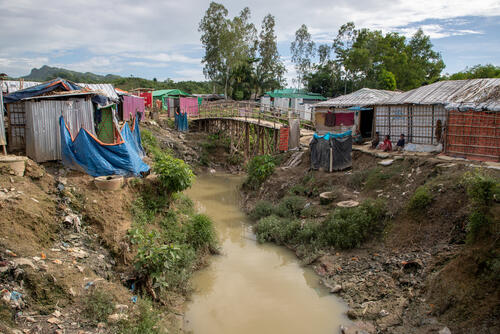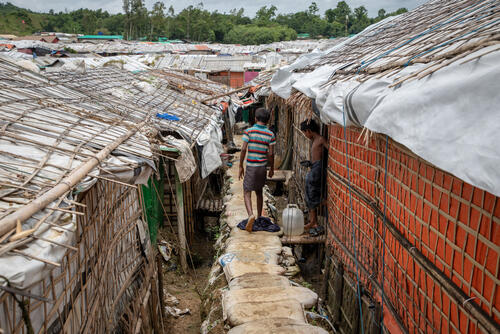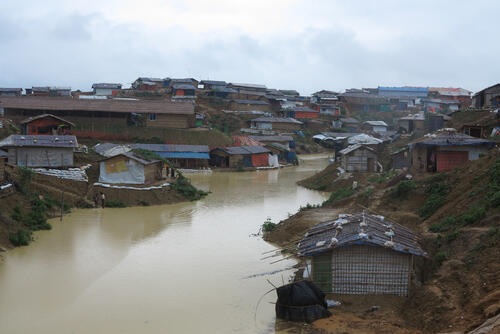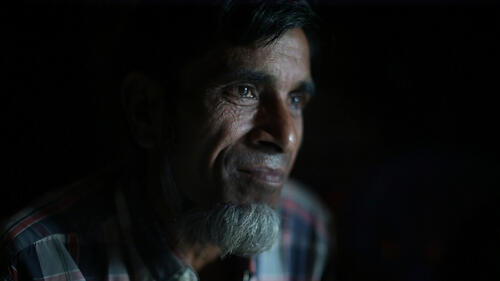Prodjut Roy, a mental health supervisor with MSF, has been working as part of the Nayapara primary health centre team in Teknaf, Bangladesh, since June. During that time, he has seen the stigma associated with mental health services in the Rohingya community, but also patients who have found peace through the services of ‘shanti khana’.
“Sometimes they come secretly. They don’t want to share that they have some problems. They know their information will be kept confidential but when we ask if they know of other people who have similar problems, they don’t want to discuss the issue. They’re keeping the problem within the family members and they’re not going to expose the problem to others,” says Roy.
Roy witnessed the impact of stigma first-hand on a visit to the nearby Unchiprang primary health centre. When a patient registers at an MSF health centre, he or she receives an outpatient card indicating the kind of medical assistance sought. In this case, the card indicated that the patient was visiting the health centre for mental health services. The ‘crowd controller’, who manages the patient flow, invited her to come through to the mental health counselling room. Roy noticed that this made the patient extremely upset.
“The patient explained that, in their community, ‘mental’ means insane, ‘mental’ means crazy, ‘mental’ means mad. I shared this experience with the team and from that day I asked them, please don’t use the word ‘mental’ in the facility or the community,” said Roy.
Instead staff and volunteers use the term ‘shanti khana’. “Shanti means peace,” explains Roy. “The Rohingya know mental health as ‘peace centre’. They don’t like psychology, they don’t know mental health, but they like shanti khana.”
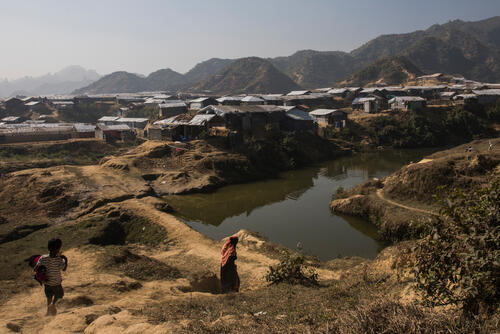
Breaking down the stigma of mental health
Health promotion and psychology education activities carried out by volunteers in the community have started to ease the stigma around mental health. The Nayapara primary health centre has seen the number of patients seeking mental health services almost double in the last few months.
Patients present with a mix of problems. The violence they experienced and witnessed has left its mark. Many suffer from post-traumatic stress disorder or acute depression. This is compounded by their current situation, the daily difficulties of living in a refugee camp, and uncertainty about their future.
“They have flashbacks,” said Roy. “They can’t sleep. They can’t differentiate between the present and the future. When the flashbacks come, their bodies are shivering. When they see the army of Bangladesh, they can’t differentiate it from the army of [Myanmar], so they run… And sometimes they experience psychosis.”
Roy tells the story of one particularly difficult case, that of a young women who was suicidal. Unfortunately, she was in the early stages of pregnancy so was not able to take the medication that may otherwise have helped her. Roy worked with her, together with another specialist, over several months to provide support and slowly saw her improve. Eventually, once it was safe to do so, the MSF psychiatrist was also able to prescribe psychiatric medication.
“Every day, we see the same patients. They’re coming for follow-up. They’re coming with problems. And one day, they’re getting better. That day is very special for us as mental health practitioners,” said Roy.
Since August 2017, MSF has conducted over 16,000 individual mental health consultations and 18,000 group mental health sessions among Rohingya refugees living in Bangladesh’s Cox’s Bazar district.
All MSF health facilities provide mental health services, and both psychological and psychiatric services are available at all inpatient facilities and some primary health centres.
The limited availability of mental health services and particularly more advanced mental health services, including psychiatric care, in this area of Bangladesh remains a serious concern for MSF.



